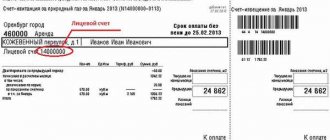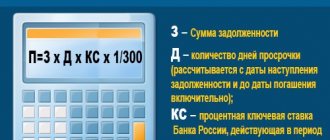On January 1, 2021, the moratorium on the collection of penalties for non-payment of housing and communal services expired. In this regard, housing and communal services suppliers have many questions: the main ones were answered by the Head of the Expert Council of the P1 Association, Elena Shereshovets, in a new video from the online magazine “Housing and communal services: dreams come true.”
The management authority can collect from local authorities an increasing coefficient for CG
69720
The procedure for calculating penalties for utilities
Penalties are penalties for violations of the procedure for paying utility bills and paying contributions for major repairs. The obligation to pay them occurs in two cases:
- late payment
- payment not in full
Payment of penalties is carried out in the same manner both for payment for premises and utilities, and for contributions for major repairs. The only difference is their size.
The amount of the penalty is one three-hundredth (1/300) or one hundred-thirtieth (1/130) of the refinancing rate of the Central Bank of the Russian Federation of the unpaid amount in effect on the day of payment. Considering that the refinancing rate has no independent meaning and is equal to the key rate, it would be correct to consider the penalty as one three hundredth of the key rate.
| Penalty amount for payment for housing and utilities | ||
| First 90 days of late payment | From 90 days of delay | |
| Penalty amount | 1/300 key rate | 1/130 key rate |
| Amount of penalty for making a contribution for major repairs | ||
| Penalty amount | Fixed – 1/300 of the key rate | |
Penalties begin to accrue from the 31st day of late payment.
Moreover, their size cannot be more than 1/130 of the key rate of the amount unpaid on time for each day of delay.
Payment rules for housing and communal services
The obligation of the homeowner or tenant to pay for the provided housing and communal services is stated in Article 153 of the Housing Code of the Russian Federation and in subparagraph “i” of paragraph 34 of the Rules, approved by Decree of the Government of the Russian Federation of December 26, 2016 No. 354.
Payment must be made on time and in full
. The deadline for paying the fee is determined in accordance with the management agreement of the apartment building or the decision of the general meeting of members of the housing cooperative.
If the deadline is not specified in these documents, then the homeowner must pay the cost of housing and communal services no later than the 10th day of the month following the expiration. This condition is specified in Part 1 of Article 155 of the RF Housing Code.
Is it possible not to pay penalties for utilities?
The obligation of citizens and organizations to pay for utilities is established by law.
If you do not make payments on time or not in full, a debt will accumulate, which can be collected in court. At the same time, the procedure for collecting debts for utility services is quite simple - the court issues a court order.
During the period of coronavirus restrictive measures, there is a widespread opinion among citizens that it is possible not to pay utility bills. This is not true. The obligation to pay for housing, utilities and major repairs remains.
Utility service providers do not have the right to demand payment of penalties (penalties) until 01/01/2021. The same rule applies to contributions for major repairs.
Thus, due to the current situation and coronavirus restrictive measures, until January 1, 2021, you do not have to pay penalties.
At the same time, the Supreme Court clarified that this right applies to debt that has arisen since April 6, 2021.
USEFUL : if you have an illegal penalty included in your receipt, feel free to request a recalculation, watch the video in what order to do this
Collection of penalties for utilities
Penalties for utilities are usually collected along with the amount of the principal debt.
To collect penalties, utility service providers or another authorized organization with which an agency agreement has been concluded applies to the court with an application for a court order or with a statement of claim in summary proceedings. A calculation of the amount of claims, the basis for such calculation (agreement) and a calculation of the amount of penalties are provided.
The court order issued by the court is sent for execution to the FSSP, where measures will be taken to search for the debtor and foreclose on his property in the event of non-payment of the debt amount voluntarily.
Key rate (refinancing rate)
- From June 17, 2019, the key rate (refinancing rate) of the Bank of Russia is 7.50% (Information from the Bank of Russia dated June 14, 2019);
- From December 17, 2018 – June 16, 2019, the key rate (refinancing rate) of the Bank of Russia is 7.75% (Information from the Bank of Russia dated December 14, 2018);
- From September 17, 2018 – December 16, 2019, the key rate (refinancing rate) of the Bank of Russia is 7.50% (Information from the Bank of Russia dated September 14, 2018);
- From March 26, 2018 – September 16, 2018, the key rate (refinancing rate) of the Bank of Russia is 7.25% (Information from the Bank of Russia dated March 23, 2018).
Current data on the key rate of the Central Bank of the Russian Federation can be easily found on the Internet.
Statute of limitations for penalties for utilities
The utility service provider may demand payment of penalties throughout the entire term of the contract and beyond in case of debt.
Another thing is that this debt can be collected within three years (3 years) . In this case, three years are calculated separately for each monthly payment. The statute of limitations for collecting penalties for utilities expires when the statute of limitations for collecting the principal amount of the utility payment, for the delay of which penalties were accrued, expires.
Application for write-off of fines on rent
The utility service provider may decide to write off penalties. There may be legal grounds for this or an agreement with the utility organization (agreement).
An application can be written in the following cases:
- The statute of limitations for obligations has expired
- Debtor's bankruptcy
- Purpose of restructuring (agreement with a utility company on debt repayment)
- Private, personal reasons that prevented the fulfillment of the obligation to pay for utilities - illness, disaster, etc.
- Disproportionality of penalties to the amount of debt
- Incorrect calculation of penalties
- Based on the above reasons, the penalty can be written off in whole or in part.
- Suspension of accrual of penalties for utilities
- During the period of coronavirus restrictive measures introduced throughout Russia, a Government Resolution banning the collection of penalties for utilities and major repairs came into force.
NOTE : also read additional tips on installment payments for utilities via the link on our website
Summary
The stumbling block between housing rights holders and housing and communal services is the payment of utility payments overdue. The fact is that money for calculating penalties is the only working method of motivating debtors to pay off their debts.
Energy companies, management companies and homeowners' associations have no income other than that received from residents: they depend on each payment. Having a huge debt in the homeowners' association's checking account is a direct path to bankruptcy. Debts increase like a snowball due to the accrual of penalties. Such a tragic ending for management companies and homeowners associations is not beneficial to anyone: neither the supplier nor the consumers.
If a tenant does not pay penalties on utility bills and, at the same time, ignores the “body” of the debt itself, then he faces severe enforcement by a court decision, through bailiffs. But we should not forget an important nuance: the amount of the penalty can be made much smaller or canceled altogether, if we take into account the special circumstances that we talked about.
Reducing penalties for utility bills through court proceedings
As a general rule, if no attempts are made to reduce the penalty for utilities, then the court will, of course, take as a basis the calculation provided by the plaintiff. Therefore, I recommend filing a petition to reduce the amount with justification for the objection under Art. 333 of the Civil Code of the Russian Federation (more details at the link).
In such cases, according to established judicial practice, there should be a comparison of the accrued penalty with the amount of debt, when it is clearly disproportionate to the violated obligation - it is necessary to review the accrued penalties in the direction of reducing utility bills, in particular, a good example in the form of the Moscow City Court’s Ruling dated 05/06/2016 serves as confirmation in case No. 4g-4416/2016.
Other reasons for reducing penalties for utility services include:
- Other noteworthy circumstances of the case under consideration, for example, incorrect calculation of the initially indicated amounts, which led to a dispute (payments to the reserve fund for major repairs, fees for the maintenance of the common property of the house, etc.)
- Penalties should not be collected for the first month, such are the new rules for calculating fines for this category of cases
- If the defendant did not receive information about his debt, for example, the order of delivery of receipts was violated, there was no written requirement to repay the debt in the receipts provided, then all this should be used when deciding whether to reduce the amount of the penalty for a communal apartment
In addition, be sure to analyze the claim of your management company for the limitation period, because if penalties are accrued on the amount of debt outside the three-year limitation period, then you have every reason to demand that these accruals be excluded completely from the calculation of claims.
Why don’t utility companies voluntarily reduce or remove penalties if a person cannot get out of housing and communal services debt?
Everyone can find themselves in a difficult situation when various events occur in life: loss of a job, illness of a utility payer or their close relatives.
Of course, in such cases there is no time for payments that are not paramount. The question of how to avoid paying penalties for rent is the first thing that comes to mind. But the law is the law, even if it is sometimes unfair in relation to a particular citizen...
If utility companies cancel penalties without trial:
- Other residents will suffer, because they pay in good faith, and the negative consequences of delays and losses of managers, in connection with this, may hit their wallets
- Writing off penalties on rent by the head of an HOA or housing cooperative may turn against the chairman, against whom residents and employees may complain that he is reducing revenues by such actions, has entered into a conspiracy, etc.
That is why it is possible to solve the problem of reducing utility services only in court through Article 333 of the Civil Code of the Russian Federation.
Rules, terms, accrual amounts
These are accrued costs for late payments that accumulate on a daily basis. The legislation, we found out, allows you to independently determine its daily value. The penalty for late payment of rent must be within the legal maximum.
Need a calculator: a reliable calculation tool
Would you like to calculate penalties for late payments? Then use such a universal and convenient tool as an online calculator. All calculations take place in rubles. “Where can I find such a calculator?” - you ask. There is a large selection of calculators on the Internet for calculating penalties. We present one of them:
The penalty is calculated by filling out all available columns on the calculator plane, such as: the debt amount, the date of its occurrence and the date of payment.
The amount of interest when there are arrears for electricity and rent
Now there is a proportion according to which the amount of debt interest depends on the duration of non-payment:
| №/№ | Time of non-payment | Amount of penalty |
| 1. | Up to three months | Equal to or less than one three hundredth of the Central Bank rate on the day the delay was detected |
| 2. | From ninety days | Equal to or less than 1/300 |
| 3. | It is illegal if the amount of interest accrued in the form of penalties exceeds 50% of the total debt | |
Information as an example: if the utility debt is fifteen thousand rubles, then the total amount of the penalty should be less than seven and a half thousand. The difficulty lies in the fact that, regardless of the presence of debt, citizens accept the services of public utilities, thereby increasing the debt “basket” and interest.
Penalties are “dripping”: when does the debt “leakage” begin?
The accrual process starts on the next day after the day determined by the final calendar point of the “payment stop”. This calendar “point” is determined in two ways:
- or a condition of the agreement;
- or regulations of the regional utility service.
A number of regional services provide a notification repayment system: interest is accrued from the next day after the debtor receives a special utility bill.








